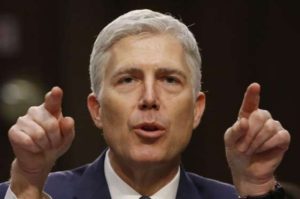I am going to reveal my own bias — once again — but here goes anyway.
Neil Gorsuch is going to become the next U.S. Supreme Court justice on Monday. The U.S. Senate confirmed him in a mostly partisan vote.
Donald Trump promised to select a conservative justice for the court and he delivered on his promise.
Fine. Trump is the president and he has the right to select anyone he wants.
Gorsuch’s testimony before the Senate Judiciary Committee was filled with the usual stuff that court nominees say, which is they cannot comment on issues that might come before the court. His reticence satisfied Senate Republicans and frustrated Senate Democrats.
He did, though, suggest that Roe v. Wade — the landmark 1973 decision that legalized abortion — essentially is “settled law.” He also said the president never asked him if he’d vote to overturn the ruling, adding that had Trump done so, that he (Gorsuch) would “have walked out of the room.”
My hope for the new justice is that he becomes more of an independent thinker than his critics believe he’ll be. There’s plenty of precedent on the Supreme Court for justices becoming something other than the presidents who appoint them had hoped.
President Eisenhower selected Chief Justice Earl Warren and William Brennan, both of whom became liberal stalwarts on the court; President Nixon selected Justice Harry Blackmun, who then wrote the Roe opinion in January 1973; President Ford selected Justice John Paul Stevens, who then joined the liberal ranks on the high court; President George W. Bush selected Chief Justice John Roberts, who then voted to preserve the Affordable Care Act.
No one should seek to predict how the new justice will comport himself on the court. Some, though, have done so. I am not nearly learned enough in matters of law to make such a prediction.
I do have my hope … and my bias that drives it.
